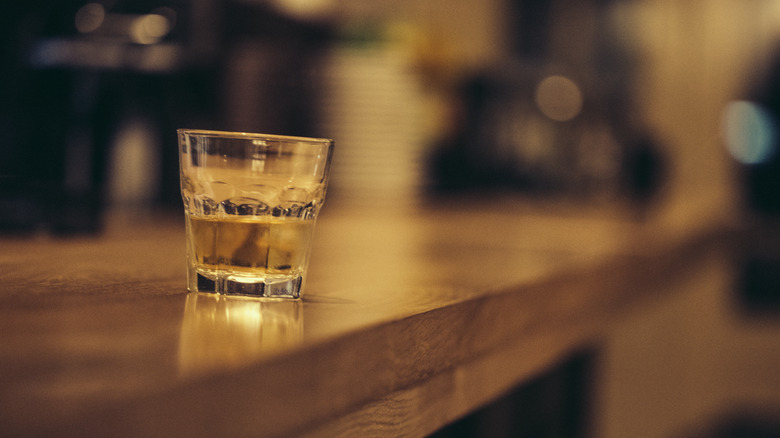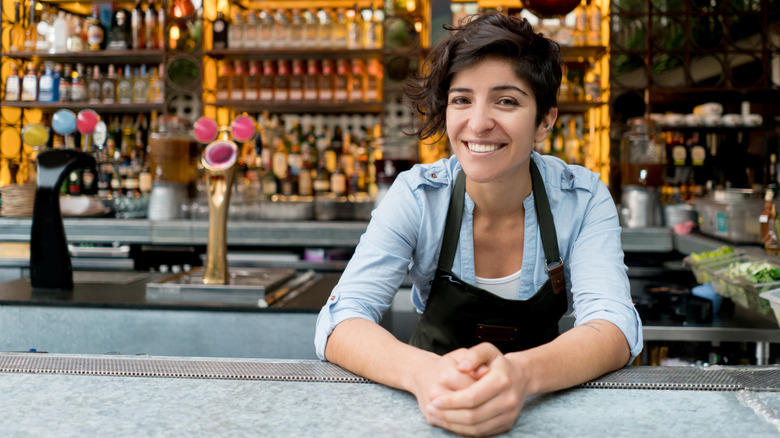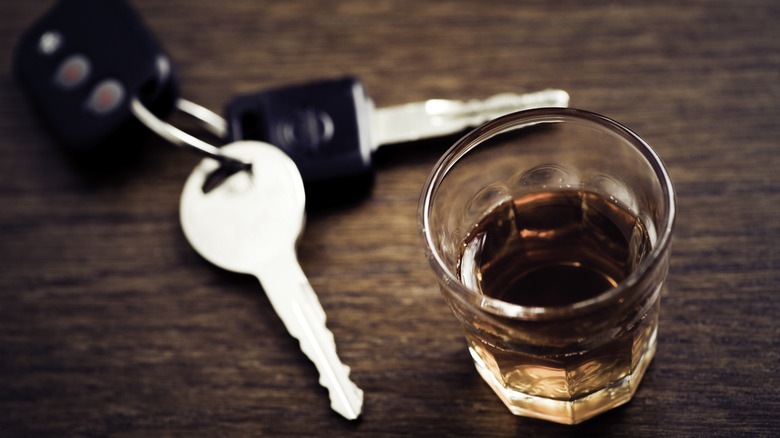The Fictional Drink That Raises Red Flags For Bartenders
If you're working at a bar, and a customer tries to order an "angel shot," you should be concerned. That's because the angel shot isn't a real drink, it's actually a code word for customers to alert bar staff that they're feeling unsafe or uncomfortable — for example, if they're on a Hinge date, and their date is harassing them or acting creepily.
There are typically a few ways to "order" the angel shot, which lets staff know how they should respond. If it's ordered neat, a bartender should escort the person to their car; if it's on the rocks, that's a sign for the staff to order a cab or an Uber for the person to get home safely. Lastly, ordering it with lime alerts staff to call the police. Pay attention though because the code words may change from bar to bar — if a bar uses the system, the exact details should generally be advertised in locations like the women's restroom.
Where did it come from?
The angel shot concept started out in the U.K., where instead of asking for a shot, customers facing these problems would ask for a fictional person called "Angela" (the "angel shot" name was an adaptation of this). Although the angel shot idea received plenty of attention on social media in recent years, particularly through viral TikToks, social media users didn't create the angel shot — they just helped to popularize it.
"Ask for Angela" was originally a public safety campaign in Lincolnshire, in eastern England. A police inspector from that region, Hayley Crawford, created the campaign, partly in response to the shocking statistic reported by UN Women UK that 80% of British women had experienced sexual harassment in public, and just over half had experienced in bars and clubs. The original campaign didn't have the extra code words that the angel shot system uses — people who felt unsafe simply had to ask to speak with "Angela," and a trained member of staff would step in to help (be it by calling security, taking the affected person someplace safe, or helping them to leave discreetly). Beyond the obvious safety benefits, the "ask for Angela" system may have the side-effect of being good for business, as a majority of British women said they'd be more likely to visit a bar with this kind of system in place.
How effective is it?
One catch with the concept of the angel shot is that it's only helpful if the bartender knows what it is and knows how to handle a situation arising from it. Some experienced bartenders may know about it and step in, but it's not universal knowledge, so a less knowledgeable bartender may simply be confused, and overlook a bad situation. This isn't entirely their fault — many bartenders are casual workers who might just be looking for a few hours of extra work, and don't have encyclopedic knowledge of every drink and situation they encounter at work. The solution to this seems to be that bar owners or managers should make "offering" the angel shot into a house policy. This way, staff in those venues would recognize the code.
But while the angel shot may be useful, it can't fix everything. There are valid criticisms of the angel shot, including that it places the responsibility on a victim to report harassment (instead of discouraging a perpetrator in the first place), and that it's hard to publicize the system without letting the wrong people (that is, a potential harasser) in on the code word. In light of these weaknesses, venues can and should take other steps to help prevent harassment and unsafe situations, from advertising a zero-tolerance policy for inappropriate behavior, through to giving staff extra training to recognize harassment and check in on customers if they see signs of it.
If you or anyone you know has been a victim of sexual harassment or assault, help is available. Visit the Rape, Abuse & Incest National Network website or contact RAINN's National Helpline at 1-800-656-HOPE (4673).


